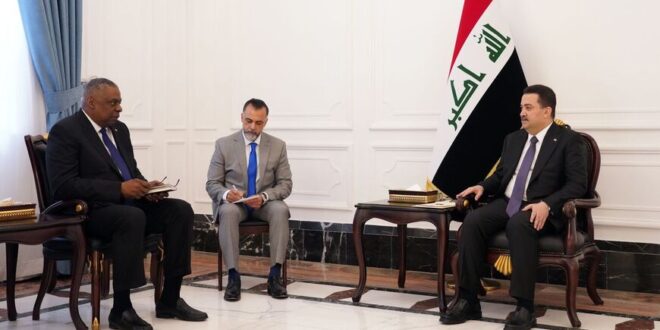Prime Minister Mohammed Shia al-Sudani is playing a delicate balancing act with pro-Iran factions as Washington keeps a low profile for its military advisers in Iraq in order to subdue the Islamic State.
More than eleven years after he led the last US battalions out of Iraq, US Defense Secretary Lloyd Austin landed in Baghdad on Wednesday to discuss the future of the US troop presence in the country with Prime Minister Mohammed Shia al-Sudani.
Following the meeting, Austin said that the current 2,500 troops in the country as part of the US-led coalition to defeat the Islamic State were “ready to remain” there at the behest of the Iraqi government.
“Now looking forward, US forces are ready to remain in Iraq at the invitation of the government of Iraq,” Austin said according to reporters traveling with him.
“These forces are operating in a non-combat, advise, assist and enable role to support the Iraqi-led fight against terrorism,” the US defense chief said.
Between the lines: Sudani’s office said in a statement following the meeting that the prime minister seeks a balanced approach to regional and international relations — a reference to the US and Iran — “based on common interests and respect for sovereignty.”
“The stability of Iraq is a key to the region’s security and stability,” Sudani’s statement read.
Since taking office last October, the Iraqi premier has walked a tightrope between his political allies in the predominately Shiite Coordination Framework and the United States, which views with suspicion certain elements of Iran’s influence in Iraq.
Low profile: Pentagon officials requested Al-Monitor and other outlets keep Austin’s visit to Iraq under wraps until arrival due to security concerns.
Two decades after the US removal of Saddam Hussein from power triggered the violent collapse of Iraqi society, the country’s security situation appears to have largely stabilized. But the central government in Baghdad remains dependent on outside support for energy, foreign currency reserves and military aid, rendering Iraq a site tense contestation for influence between Washington and Tehran.
As American military forces continue to advise and assist Iraqi troops against IS, defense officials say Iran’s Islamic Revolutionary Guard Corps continues to arm and fund proxy militias in Iraq and other countries in the Middle East as it seeks leverage over the United States and its allies.
Washington has accused Iran-backed groups in Iraq — some of which are represented in Sudani’s coalition in parliament — of launching repeated rocket attacks against US and coalition forces in recent years amid the Trump administration’s “maximum pressure” campaign against Tehran and the January 2020 assassination of IRGC Quds Force chief Qasem Soleimani in Baghdad.
But the militias have largely held off on attacking US forces in Iraq in recent months, in what Pentagon officials describe as a bid to avoid undermining their own political gains in Baghdad.
A senior US defense official told reporters at the Pentagon ahead of Austin’s visit that Iran arms the groups partly in order keep the Iraqi government under threat.
“Part of this is to threaten US partners with coercive tactics,” the official said, adding, “And part of it is because there’s an ideological orientation of the [Iranian] regime that doesn’t want US forces present in the region, and doesn’t want the United States to have strategic partnerships in the Middle East so that Iran can dominate the Middle East.”
The United States roughly halved its troop presence in Iraq in 2020, shifting to an advisory role alongside local commanders as American officials cited progress by Iraqi security forces in fighting the remaining IS networks on their own. The Pentagon later acknowledged continued rocket attacks by Iran-backed militias hastened the drawdown.
In 2021, US and Iraqi officials announced an end to the US combat mission in Iraq. The move was widely seen as intended to relieve domestic political pressure on then-Prime Minister Mustafa al-Kadhimi.
Though US troops, notably special operations forces, continue to assist Iraqi security forces during operations against IS, American officials say they are not in the lead. US military personnel supported Iraqi security forces in 33 operations against IS in the month of February alone, according to numbers released by US Central Command.
“We — US forces and the coalition — remain in an advise, assist and enable role. So there are not unilateral operations. They are partnered operations,” the senior defense official said.
Rewind: Three years after the United States withdrew from Iraq in 2011, the Obama administration redeployed troops to the country at Baghdad’s request as Iraq’s military faced sweeping conquests by the Islamic State group as part of spillover from the civil war in neighboring Syria.
Both the United States and Iran armed and supported local forces in Iraq to beat back the jihadist organization and retake territory, leading to tense encounters once IS was largely wiped off the battlefield in Iraq in 2018. But IS sleeper cells remain and continue to conduct attacks on Iraqi security forces from hideouts in the country’s rural regions.
What’s next: Austin headed to Erbil following meetings in Baghdad to sit down with President of the Kurdistan Regional Government Nechirvan Barzani.
The US defense secretary is scheduled to travel back to Jordan today ahead of visits to Egypt and Israel on Wednesday.
 Eurasia Press & News
Eurasia Press & News


